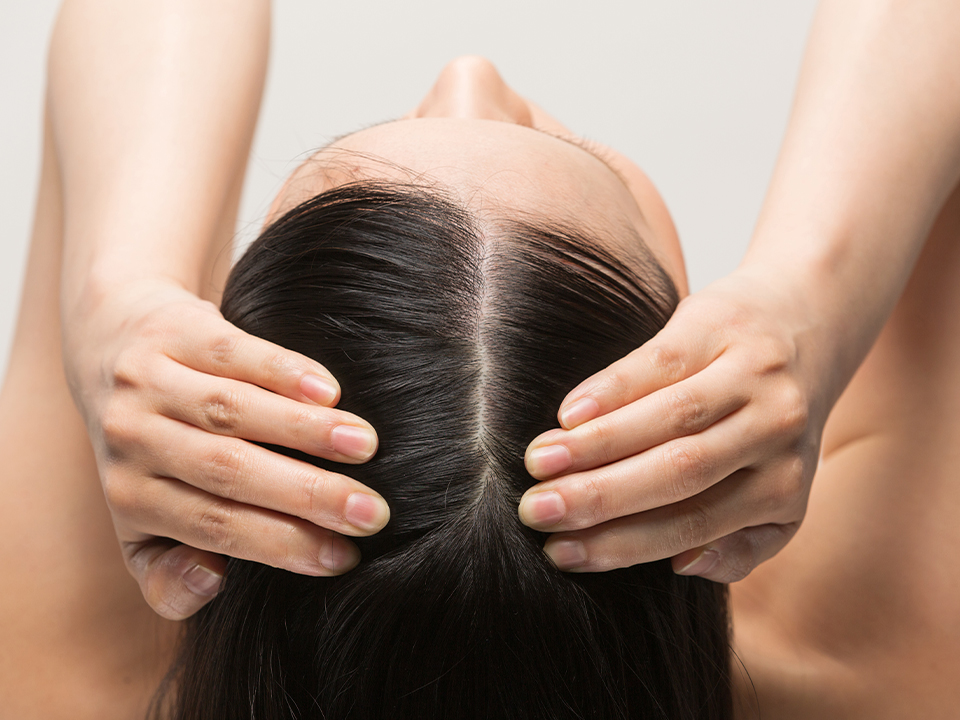Christoffels is open and taking appropriate actions to ensure customer and staff safety
Christoffels is open and taking appropriate actions to ensure customer and staff safety

Whether you are experiencing gradual hair loss or sudden thinning, understanding the underlying causes can help you determine which effective treatment options to pursue. One crucial but often overlooked aspect of effective hair loss treatment is to consider the health of your scalp. A healthy scalp is the foundation for hair regrowth and maintaining the appearance of healthy hair for both men and women.
Thinning hair can be caused by a variety of factors, including genetics, hormonal changes, nutritional deficiencies, and certain medical conditions. Genetics play a significant role in determining hair thickness and density. If your parents or grandparents experienced thinning hair, there is a significantly higher likelihood of you facing similar hair challenges. Hormonal changes, such as those experienced during menopause or pregnancy, can also disrupt the hair growth cycle and lead to temporary or permanent hair loss. Nutritional deficiencies, particularly in iron, zinc, and biotin, can weaken hair follicles and contribute to thinning hair. Additionally, medical conditions like alopecia areata and thyroid disorders can also cause hair loss.
A healthy scalp is vital for hair regrowth and overall hair health. The scalp provides the nourishment and support necessary for hair follicles to produce strong and vibrant hair. When the scalp is unhealthy, it becomes difficult for hair follicles to thrive, leading to thinning hair. Therefore, addressing scalp health is crucial in any hair loss treatment plan.
To maintain a healthy scalp, it is essential to keep it clean and free from excessive oil, dirt, and product buildup. Regularly shampooing your hair with a gentle cleanser can help remove impurities and maintain scalp hygiene. Avoid using harsh chemical-laden products that can strip the scalp of its natural oils and cause dryness or irritation. Additionally, maintaining a balanced diet rich in vitamins, minerals, and antioxidants can promote scalp health. Foods like salmon, eggs, spinach, and sweet potatoes provide essential nutrients that nourish the scalp and support hair growth.
When it comes to treating thinning hair, there are several professional treatments and therapies available that have shown promising results. One popular option is platelet-rich plasma (PRP) therapy. PRP therapy involves injecting your own platelet-rich plasma into the scalp to stimulate hair growth. The growth factors present in the plasma help rejuvenate hair follicles and promote hair regrowth. This non-surgical procedure has proven to be safe and effective for both men and women.
Another professional treatment option is low-level laser therapy (LLLT). LLLT uses red light wavelengths to stimulate hair follicles and promote hair growth. This therapy can be done at specialized clinics or by using laser hair loss treatment devices at home. LLLT is a non-invasive and painless treatment that has shown positive results in improving hair thickness and density.
Hair loss affects both men and women, but the patterns and causes can differ between the two genders. For men, the most common cause of hair loss is male pattern baldness, also known as androgenetic alopecia. This condition is typically characterized by a receding hairline and thinning crown. Fortunately, there are specific treatment options available that target male pattern baldness.
One popular treatment for male pattern baldness is minoxidil, an FDA-approved topical solution. Minoxidil, widely sold under the trade name Rogaine, works by increasing blood flow to the scalp, revitalizing hair follicles, and promoting hair regrowth. It is available over the counter and is easy to incorporate into your daily routine. Another effective treatment option is finasteride, an oral medication that helps block the conversion of testosterone into dihydrotestosterone (DHT). DHT is a hormone that contributes to hair loss in men. By reducing DHT levels, finasteride can slow down hair loss and promote regrowth.
In more advanced cases of male pattern baldness, hair transplant surgery may be recommended. This surgical procedure involves removing hair follicles from a donor area and transplanting them into areas with thinning or no hair. Hair transplant surgery provides a permanent solution to hair loss and can restore a full head of hair based on available donor hair of the patient.
In addition to professional treatments, there are several steps you can take to maintain a healthy scalp and prevent further hair loss. Firstly, avoid excessive heat styling and harsh chemical treatments that can damage hair follicles and weaken the scalp. If you must use heat styling tools, always apply a heat protectant and use the lowest heat setting possible.
Regular scalp massages can also promote scalp health and hair growth. Massaging the scalp helps improve blood circulation, which brings essential nutrients to the hair follicles. Use your fingertips to gently massage your scalp in circular motions for a few minutes each day.
Furthermore, protecting your hair from the sun’s harmful UV rays is essential for maintaining a healthy scalp. Apply a sunscreen specifically designed for the scalp or wear a hat to shield your scalp from sun damage. Lastly, manage stress levels through relaxation techniques like meditation, yoga, or deep breathing exercises. High stress levels can contribute to hair loss, so taking steps to reduce stress can help prevent further thinning.
In conclusion, addressing scalp health is crucial when it comes to treating thinning hair and promoting hair regrowth. Understanding the underlying causes of hair loss, such as genetics, hormonal changes, and nutritional deficiencies, can guide you towards effective treatment options. A healthy scalp provides the necessary foundation for hair follicles to thrive and produce strong, lush hair. By incorporating professional treatments, maintaining a healthy scalp, and adopting hair care practices to prevent further hair loss, you can say goodbye to thinning hair woes and enjoy a healthier scalp and fuller hair.
Take control of your hair health today! Consult with a professional hair loss specialist near you to explore the best treatment options for your thinning hair and start your journey toward a healthier scalp.
Blog courtesy of Transitions Hair Loss Centers.

It’s time to feel good about your hair again.
3300 East 26th Street | Sioux Falls, SD 57103